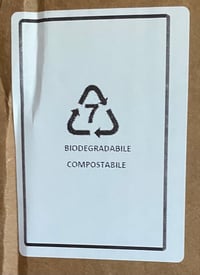We have seen a few tag materials that claim to be compostable and recyclable. If true, this would be a boon to the seafood industry and we would be first in line to embrace it. But the reality is the commercial applications don’t live up to the hype.
Here are the labels that one European company claims is Biodegradable, Compostable and Recyclable. In a technical sense they are right, but the details really matter.
Recyclable with a code “7” is essentially non-recyclable in most communities. Here are two descriptions from the web:
Any type of plastic that doesn’t fit into one of the first six categories falls under this heading. Products stamped with a 7 are often made out of multiple plastic types or out of other types of plastic that can’t easily be recycled. (https://millerrecycling.com/plastics-recycling-numbers)
Number 7 plastics often fall under the miscellaneous category, where anything goes. For years, plastics with resin code 7 weren’t recyclable. This is one of the reasons it isn’t recycled much. Today, the recyclers that recycle number 7 plastics use modern, high rate composting which is costly to run. (https://containerfaqs.com/plastic-number-7-recycling/)
What about the "OK to Compost" label? The OK to compost label is a well respected European standard. According to their website:
Products that are solely OK compost INDUSTRIAL-certified are those that compost only in industrial composting facilities (at temperatures between 55 to 60°C) [131°F to 140°F], so products that are solely OK compost INDUSTRIAL-certified should not go into the garden compost. (https://www.tuv-at.be/green-marks/certifications/ok-compost-seedling/)
Bottom Line: If you live in a community with a really sophisticated recycling program or have an industrial scale composting system this material is good for the environment. If you don’t (and most of us don’t) it is just pure greenwashing. Might as well save your money.
For more information on the broader challenge of plastic recycling, this Frontline Documentary is a good starting point. This is a hard problem and I wish we had a better solution--but making consumers feel good by misleading them is not helpful to anyone.
The bigger problem for the industry as a whole is the packaging (boxes, bags, styrofoam containers) that are necessary for safe and efficient food handling, but are seldom recycled.


